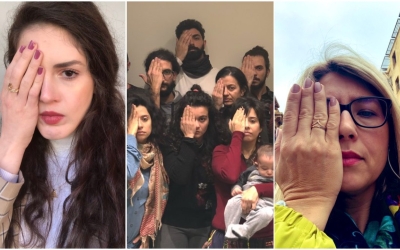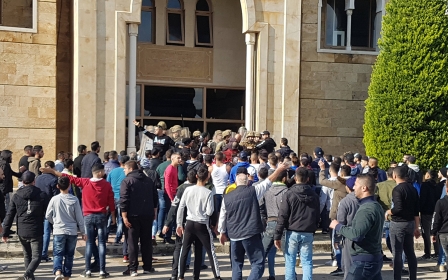Petitions, uproar, and political deadlock: Lebanon's foreign minister bails Davos

Lebanon's caretaker foreign minister has cancelled his appearance at the World Economic Forum in Davos on Tuesday, due to "rapid developments" in the formation of a new cabinet, local TV channel LBCI reported.
Gebran Bassil, who is also an MP and leader of the Free Patriotic Movement party, had faced widespread criticism for attending the elite annual event a worsening economic and political crisis at home.
Lebanon has been rocked by mainly peaceful anti-government rallies since 17 October but the protests turned violent over the weekend amid political stalemate and the deepening economic crisis.
In recent days more than 18,000 Lebanese have taken part in a Twitter poll, in which over 75 percent said Bassil didn't represent them.
Despite the public backlash, he is still scheduled to speak at the Swiss city on Thursday at a panel titled: "The Return of Arab Unrest."
New MEE newsletter: Jerusalem Dispatch
Sign up to get the latest insights and analysis on Israel-Palestine, alongside Turkey Unpacked and other MEE newsletters
Bassil first appeared at Davos last year where his most memorable moment was an interview with CNN's Becky Anderson.
He suggested that he could teach others how to run a country without a budget while Lebanon faced political deadlock trying to form a cabinet.
"We should maybe teach them [Washington DC and London] how to run a country without a government," Bassil told to an unamused Anderson.
"Because Lebanon, you know, gets adapted to every difficult situation."
Lebanon is currently facing its worst economic crisis in decades which has resulted in regular street protests, with thousands demanding a new political and economic system.
Since Prime Minister Saad Hariri resigned on 29 October, Lebanon's ruling parties have been scrambling to form a new cabinet.
Though the popular mobilisations have targeted all of Lebanon's political rulers and parties, Bassil, also the son-in-law of Lebanon's President Michel Aoun, has faced mounting criticism.
"In a situation like this, where people are trying to change the system ... you can't have one of the most controversial of the system represent the country in its entirety," Ghina, a young graduate working in the medical field, told MEE.
"The country's economy is falling apart, and no strategic plan to alleviate the situation was put forth by anyone in those 90 days – including him."
'Hold Gebran Bassil to account'
Those against his appearance say that Lebanon's dire economic situation, the state's violent response to protestors, and the people rejecting the country's political class means that Bassil does not fairly represent the Lebanese people. Tens of thousands signed petitions condemning the Bassil Davos debacle.
However, those backing Bassil say that as caretaker foreign minister, and part of the largest bloc in Parliament, he has the legitimacy to represent Lebanon on the international stage. They believe that targeting Bassil has political motivations.
The petitions transferred onto Twitter, where two trending hashtags competed for public opinion. Those who backed Bassil, tweeted their support with #Gebran_Bassil_Represents_Me.
Those who didn’t tweeted with #Gebran_Bassil_Doesnt_Represent_Me.
The uproar eventually reached CNBC news anchor and correspondent Hadley Gamble, scheduled to moderate the panel at Davos.
"There's been a lot of concern in the last 24 hours – I have to say – from our Lebanese viewers about whether or not this gentleman (Gebran Bassil) should be on a panel," said Gamble, adding that many people reached out on her on Twitter and Instagram saying Lebanon is going through a critical phase. She assured them that Bassil would not get an easy ride.
Gamble said, "We are going to hold Gebran Bassil very much to account on what is happening in Lebanon."
Her announcement, which was shared in a video on her Twitter account, was met with mixed responses.
Unsurprisingly, the Free Patriotic Movement did not take kindly to the anti-Bassil campaigns – nor Hadley Gamble’s comments for that matter.
The party's vice president, May Khreish, told local television station Al-Jadeed that the campaign was "Zionist".
"Anyone in Lebanon who joins the campaign against his participation in the conference is directly or indirectly participating in the Zionist campaign," Khreish said in a phone interview with the local television station.
"He has popular legitimacy and is carrying out his duties."
Khreish also called Gamble a "tool of the Zionist campaign" in a tweet, attaching a photo of the CNBC journalist smiling next to former Israeli prime minister Shimon Peres.
Middle East Eye delivers independent and unrivalled coverage and analysis of the Middle East, North Africa and beyond. To learn more about republishing this content and the associated fees, please fill out this form. More about MEE can be found here.





